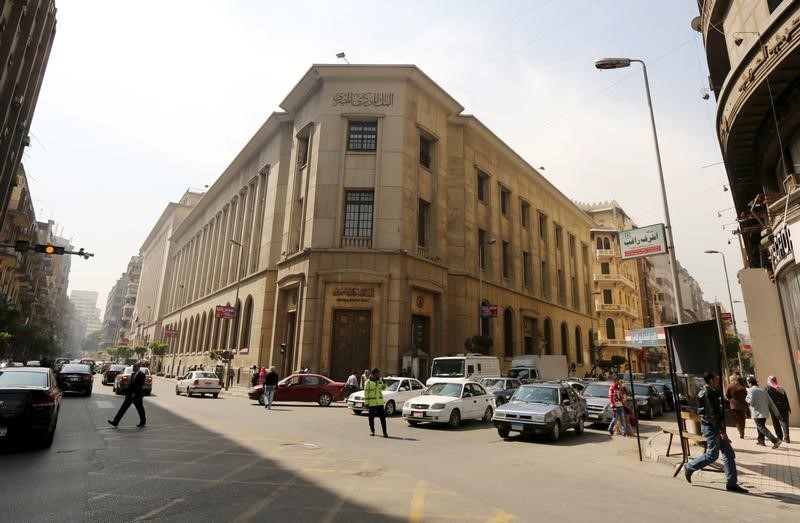By Asma Alsharif, Lin Noueihed and Ehab Farouk
CAIRO (Reuters) - Egypt's central bank devalued the pound on Monday and said it would move to a more flexible exchange rate regime, in an effort to rebalance markets and ease a foreign exchange shortage that had stifled business activity and hit confidence.
Egypt devalued the pound to 8.85 per dollar from 7.73 and simultaneously pumped nearly $200 million into the dollar-starved banking system in a surprise sale.
"The Central Bank of Egypt has decided to follow a more flexible policy with regard to the exchange rate, aiming to resolve distortions in the exchange rate system and restore the circulation of foreign currency inside the banking system in an orderly way," the bank said in an extensive statement.
It did not explain how the new approach would work, but it vowed to rebuild forex reserves to $25 billion by the end of the year from $16.5 billion now and "maintain order in the currency market and stability in price levels in the medium term."
Cairo's main stock index rose 6.7 percent, its biggest jump since Islamist President Mohamed Mursi was toppled in mid-2013. Trading volume was the heaviest since at least 2009.
Economists welcomed a move many said was overdue and would encourage foreign investment in Egyptian stocks and government bonds, from which foreign money has fled in recent years.
"It's a welcome, but long overdue shift in policy stance - Egypt could have saved billions in reserves if it had done this 18 months ago," said Simon Williams, chief economist for Central and Eastern Europe, Middle East and Africa at HSBC.
"The question now is will they follow through - if the pound needs to weaken further, will they let it? Are the authorities ready to tolerate the rise in inflation this will inevitably bring?"
Egypt, heavily dependent on imports, has been short of foreign currency since a 2011 uprising ended Hosni Mubarak's 30-year rule, scaring off foreign investors and tourists. Since then, reserves have more than halved, weighing on the pound.
But with tens of millions living in poverty, the central bank was reluctant to devalue for fear of sparking inflation. Urban consumer inflation reached an annual 9.1 percent in February and Egypt's government has been at pains to hold down basic food prices - a politically explosive issue.
The devaluation helped close the gap between the official exchange rate and the black market level, which had depreciated to unprecedented levels near 10 to the dollar in recent weeks. Two black market traders said they would now sell dollars at about 9 pounds.
In the three-month non-deliverable forward (NDF) market
"On the micro level, it is not good for me because I have liabilities in dollars, but for the country it will be good for foreign direct investments," said a financial manager at an investment firm.
PAVING THE WAY
Central bank Governor Tarek Amer, who took over in November, had taken several steps to prepare for devaluation and a more flexible approach.
He initially appreciated the currency by 20 piasters, a move some economists said at the time was aimed at breaking the downward cycle of bets against the pound.
Amer then introduced measures to regulate trade, in an effort to cut imports by 25 percent this year and reduce demand for foreign currency. Along with that policy, devaluation should also boost the competitiveness of Egyptian exports abroad.
Amer also eased the restrictions on the deposit and withdrawal of foreign currency imposed by his predecessor in February 2015 to preserve scarce dollars for essential imports.
The restrictions were hugely unpopular with businesses, since they exacerbated the dollar shortage. That made it hard for companies to clear imports, which piled up at ports, while factory output was disrupted by delays in importing components.
To attract money from abroad, Egypt introduced new dollar- and euro-denominated certificates of deposit for Egyptian expatriates. State banks also introduced a currency hedging option to attract foreign investors to Egyptian treasuries.
As markets digested Monday's devaluation, Egypt's two largest state-owned banks said they would also offer pound-denominated investment certificates at 15 percent yields in exchange for hard currency.
The devaluation raised expectations of a bigger hike in interest rates at the central bank's next Monetary Policy Committee meeting, on Thursday, to stabilize the exchange rate and avert dollarization.
Those views were bolstered by a jump in yields on five- and 10-year treasury bonds on Monday afternoon.

"We have just started on the sustainability road – fiscal and monetary discipline dictated by a free-floating currency," Hany Genena, head of research at Beltone Financial said in a note. "Egypt did it and the... governor and all parties involved deserve applause."